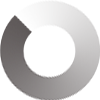With passion
For as long as I can remember, I have had a weakness for mathematics. I loved riddles, equations with unknowns, brain teasers and studying the variability of functions. I don't know where I got it from. I didn't buy it from my parents, because my Dad, a paper technician, focused on sports activities, and my Mom, a chemical technician, focused on taking care of food and board. I also didn't get into mathematics at school, because my primary school couldn't really inspire a love of exact sciences in its pupils. Maybe something went wrong in my genes.
Anyway, in math classes I always knew the answers, I cheated on tests and represented the school in math olympiads, and in the sixth grade I had no doubts that I wanted to study to be a mathematician.
For high school I chose the school named after the Czech communist Gottwald, whose patron today is Staszic. At that time they had an experimental math class, where they accepted you if you correctly solved at least one of the seven tasks on the written exam. I later gave one of these tasks to my cousin, who was then studying in his last year at the Military Technical Academy - he fought all night and surrendered only in the morning.
To a square with a side of 5 centimeters, you draw a triangle, measuring 3 cm by 4 cm by 5 cm, so that its longest side is one of the sides of the square. The task is to calculate the distance between the extreme vertex of the triangle and the center of the square, i.e. the point of intersection of its diagonals.
I still remember, and it was 38 years ago, when our professor started the first math lesson at a new school with a riddle. You have a chocolate bar that consists of 24 cubes, 6 in 4 rows. What is the smallest number of breaks that need to be made to divide the bar into 24 pieces, assuming that we break only one piece at a time.
In my second year of high school, my parents gave me a computer – a Commodore 64. What a wonderful device it was. I was completely absorbed in the fascinating world of games and programming, which became my new love.
However, I did not stop loving mathematics and chose it as my field of study.
At that time, the university offered three options for future mathematicians. One could choose to be a scientist, a teacher, or a specialist in the so-called applications of mathematics. I chose the latter option because I didn't see myself as a scientist or a teacher.
Towards the end of my studies, when I had to start looking for some form of earning money, quite by accident I received an offer to teach at a post-secondary computer science college, which I accepted, although without much enthusiasm.
After a few weeks of working as a teacher, in a way that was completely unexpected to me, I discovered that being a teacher really excites me, and after a few months I was convinced that I was born to teach.
I taught programming, I was a tutor, I even led, oh my, classes on preparation for family life, even though a large part of my students were older than me.
The most fascinating thing about this job for me was when I saw that I was able to arouse interest in students, focus their attention and make them curious about something. In short, I was fascinated by the agency in teaching. And I would probably still be a teacher today if I could make a living from it.
I found my first commercial job in my beloved programming in the film industry. In the mid-nineties, Jan Kidawa-Błoński was shooting "Virus" - a thriller about a virus that a computer scientist uses to infect the banking system. Kidawa asked two young programmers - me and my friend from college - to create special effects for the film. Our task was to create a dozen or so computer animations. Today, these animations are very mouse-like, and I watch the film with slight embarrassment, but working on it was incredibly fascinating. And seeing your name in the film's credits - priceless.
I really got into programming at Softbank. I did it for a dozen or so years. It gave me great pleasure, I was fascinated by it, absorbed, every day I felt fulfilled. And if I had to name the best of all my feelings related to this job, it would be again agency, which I felt most when someone who used what I created made me understand that it made sense. A fantastic feeling.
After many years, however, the moment came when I had to say goodbye to programming and take up management. It was terribly difficult for me, even traumatic. I felt as if I was losing the best thing that had happened to me and entering something that was a great unknown.
After some time, however, in this new area, I found a new and perhaps even greater fascination, which again comes down to agency, this time resulting from the ability to influence people.
It doesn't matter if you find your passion in gardening, love, or programming. It makes life delicious, makes you feel fulfilled, and you'll walk away knowing that you didn't waste a single moment.

